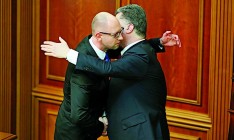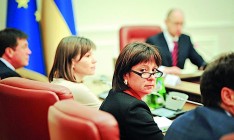Finance
state policyNew taxes will help the budget not so much as they will hurt businesses
This year, with the help of the government the Verkhovna Rada amended the Tax Code twice, the first time in March when Premier Arseniy Yatsenyuk insisted on the adoption of anti-crisis bill drafted by the government that alarmed MPs with possible default. At that time, according to Yatsenyuk the Cabinet was supposed to close the fiscal gap at UAH 289 bn. Money had to be found quickly, without postponement of unpopular initiatives for later. The government had not come up with any better idea than to rake in more money from businesses. “If these decisions are made, Ukraine will either go bankrupt or go into default. There are only two options,” insisted the premier. That time along with the taxes the VR raised excise duties on cigarettes, alcohol and diesel fuel. But this was only the beginning of the so-called “reforms”.
In a matter of four months, by introducing to the VR the next portion of anti-crisis measures, the Cabinet insisted on the introduction of electronic VAT administration and the next increase in excise duties on tobacco and alcohol products. And it was also recommended to increase rental rates for the use of subsoil by the end of the year. All initiatives drew criticism from both businesses and lobbying MPs. Failing the voting of the government’s package of amendments to the Tax Code, the VR still adopted the document in its second reading.
Climbing into the bowels
Not coping with the collection of taxes due to the armed conflict in the Donbas and the devaluation of the hryvnia, in September the government proposed to maintain higher rates for the use of subsoil in 2015. This was included in the draft amendments to the Tax Code that the Cabinet introduced to the VR, though it was nevertheless not put up for vote. The Ministry of Finance still wants to levy the new tax. The draft budget for 2015 provides for receiving nearly UAH 30 bn thanks to rent of subsoil. This is nearly UAH 10 bn more than this year.
The IMF insists on the reduction of rental rates and recommends the government to lower the fee for the use of mineral resources during extraction of natural gas by private companies from the maximum of 55% to 28% as of January 2015. Obviously, the IMF is going by the premise that the fiscal services will not be able to collect the projected UAH 30 bn. Consequently, the budget deficit will increase in connection with non-fulfillment of the revenue side, precisely the reason why the IMF wants to see more stable compensators.
It is also alarming that this year the amounts of revenues from the rent of mineral resources were lower than planned. After raising the rates officials were expecting to receive UAH 20.3 bn in proceeds by the end of the year. In fact, from the amount purchased for ten months the state received only slightly more than UAH 13 bn.
The additional tax burden may also halt the development of the mining industry. Senior Analyst at the Dragon Capital Investment Company Denys Sakva says that higher taxes will lead to a situation where companies will drill new wells only in areas where they will have a 100% guarantee that gas or oil will be discovered. Due to the increase in rent for the use of mineral resources, extraction may be reduced in six months or a year. This will most definitely happen if the government convinces the parliament to give up the temporary status of elevated rates, leaving them in force for the next year, the source said.
Bad habits die hard
Another two branches, which this year became the focus of the government’s fiscal initiatives, are the tobacco and alcohol industries. This year, the excise duty on cigarettes was increased by three times: from January 1 – by 11.7%, from July 1 – by 25% and from September 1 – by 5%. Overall, since the beginning of this year the excise duty was raised by 40%. The producers of alcohol also found themselves in a critical situation. On July 1, the excise duty on alcohol, alcoholic distillates and alcoholic beverages was increased by 25% - from UAH 56.42 per liter to UAH 70.53 per liter of 100% alcohol. The excise duty on beer was increased only once, though immediately by 42.5% - to UAH 1.24 per liter.
Back in September representatives of the specialized association Ukrpyvo warned that given the current fiscal burden on businesses they will have no choice but to shut down some of their production facilities. Chairman of the State Fiscal Service (SFS) Ihor Bilous later assured that a compromise was reached with these companies for whom taxes would not be raised at least until 2015. However, so far such provisions have not been reflected in the acts of the government or the parliament.
In addition, there is no guarantee that the premier will not insist on once again raising duties on excisable products, arguing such measures by the need to save the country’s economy and prevent its default. However, the arguments may be more commonplace. For example, in July, offering yet another tax increase for manufacturers of cigarettes and beer, Yatsenyuk argued that alcohol and tobacco are harmful to one’s health. “I think it [the increase in excise taxes] will not affect the creation of jobs and the rates of beer alcoholism, which exceeds the limit. The number of cigarettes smoked and the actual destruction of Ukrainians’ health are alarmingly high. No healthcare system will be able to treat and save the lives of Ukrainian citizens,” said the premier.
However, despite the creation of an additional burden on business, the Cabinet failed to receive a surplus in the state budget. The latest data of the State Treasury on incomes to the consolidated budget of Ukraine show that in January–October the excise duty on goods made in Ukraine remained at the same level as last year, amounting to UAH 23.4 bn.
Currency games
Looking for ways to fill the budget the Cabinet not only raised existing taxes, but also introduced new ones and revived those from the past. In particular, the nationwide pension fee of 0.5% on purchase of foreign currency was introduced in April. For ten months officials managed to collect more than UAH 5.2 bn. When the duty was introduced, the government mentioned the possibility of bringing into the budget close to UAH 9 bn by the end of the year.
Proceeds from such a monetary commission go directly to cover the deficit of the Pension Fund. However, with the introduction of the collection the transactions on the interbank foreign exchange market were almost fully suspended, thus pushing transactions into the grey market. For example, prior to the introduction of the duty the average daily volume of transactions on the interbank exchange market amounted to US $1.2–1.3 bn, while after the emergence of the tax the interbank market shrunk to US $200 mn. As a result, NBU Governor Valeria Hontareva described the situation on the interbank market as “indecent”, particularly since additional charges from currency transactions drive deals out onto the black market, which, according to analysts, is four or five times the size of the official one.
In this regard, the IMF was against the tax on currency purchases and advised the government to seek other compensators for the budget deficit. For now the Ministry of Finance is seeking a solution by proposing to leave the duty on the purchase of foreign currency only for individuals, but at the same time increasing the rate to 2%. Thus, only retail operations will be taxed, while transactions on the interbank market will remain tax-free.
The military duty was another new tax, introduced in 2014. In July, the VR adopted amendments to the Tax Code, which increased deductions from incomes of individuals by 1.5%. According to the State Treasury Service, as of November due to the tax the state budget received an additional UAH 1.4 bn.
Pulling the devil by the tail
Despite the fact that this year was replete with tax changes, the government still cannot meet its revenue plans. This year the SFS will collect almost UAH 16 bn in taxes less than planned in the state budget. This is despite the fact that the state financial control services took companies’ income taxes in advance. Bilous estimated that at present advance payments reached UAH 25 bn.
In any case, the plan for the income tax will fail, according to representatives of the SFS. Taking into account the fact that this year businesses incurred losses, the revenues from this tax will shrink in 2015 as well. The draft budget for 2015 plans for the UAH 37.9 bn in profit tax proceeds, while the targeted amount this year more than UAH 40.2 bn.
The SFS expects to get more from businesses with the help of the VAT, cutting companies from shadow schemes used for tax evasion. To do this, the electronic system for administration of the VAT should be launched in January. However, MPs from the coalition insist on the repeal of such regulations, while the SFS and the Ministry of Finance propose postponing their introduction until April, thus giving business more leeway to brace themselves.












 of the agreement of syndication with Financial Times Limited are strictly prohibited. Use of materials which refers to France-Presse, Reuters, Interfax-Ukraine, Ukrainian News, UNIAN agencies is strictly prohibited. Materials marked
of the agreement of syndication with Financial Times Limited are strictly prohibited. Use of materials which refers to France-Presse, Reuters, Interfax-Ukraine, Ukrainian News, UNIAN agencies is strictly prohibited. Materials marked  are published as advertisements.
are published as advertisements.